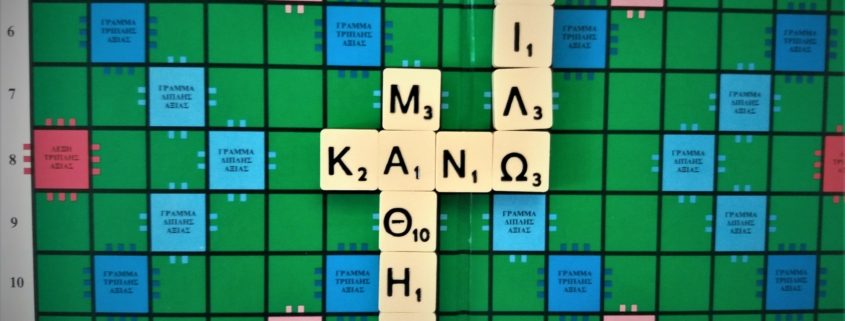How to say ‚ÄúI do‚ÄĚ in Greek and other useful sentences with this verb?
One of the most important verbs that you need to memorize when starting learning Greek is the verb ‚Äúőļő¨őĹŌČ‚ÄĚ = I do or I make
It is an easy verb that we use in many everyday phrases. Below you will find some important expressions and some useful tips on how to use this verb. Let’s have a look!
The verb őļő¨őĹŌČ – I do/I make
Let’s see some examples:
ő§őĻ őļő¨őĹőĶőĻŌā; =¬† ¬† ¬† ¬† ¬† ¬† ¬† ¬† ¬† ¬† ¬† ¬† ¬† ¬† ¬† ¬† How are you?
őó őēőĽő≠őĹő∑ őļő¨őĹőĶőĻ ő≤ŌĆőĽŌĄőĪ. =¬† ¬† ¬† ¬† ¬† ¬†Eleni goes for a walk.
őēő≥Ōé őļő¨őĹŌČ őľő¨őłő∑őľőĪ. =¬† ¬† ¬† ¬† ¬† ¬† ¬† ¬†I teach/ do a lesson.
ő§őĻ őīőŅŌÖőĽőĶőĻő¨ őļő¨őĹőĶőĻŌā; =¬† ¬† ¬† ¬† ¬† ¬† ¬† ¬† ¬†What is your job?
ő§őĻ őļő¨őĹőĶőĻŌā ŌÉőģőľőĶŌĀőĪ; – őĒőĶőĹ őļő¨őĹŌČ ŌĄőĮŌÄőŅŌĄőĪ. = –¬† ¬† ¬† ¬† ¬† What are you doing today? ‚ÄďI am not doing anything.
ő§őĻ őļő¨őĹőŅŌÖőĹ ŌĄőĪ ŌÄőĪőĻőīőĻő¨; – ő†őĪőĮő∂őŅŌÖőĹ. =¬† ¬† ¬† ¬† ¬† ¬† ¬† ¬† ¬† ¬† ¬† What are the children doing? ‚ÄďThey are playing.
ő†ŌĆŌÉőŅ őļő¨őĹőĶőĻ őĪŌÖŌĄŌĆ; =¬† ¬† ¬† ¬† ¬† ¬† ¬† ¬† ¬† ¬† ¬† ¬† ¬† ¬† ¬† ¬† ¬† ¬† ¬† ¬† ¬† ¬† ¬† ¬† How much is it?
Some Greek grammar
This verb belongs to the first group of verbs you learn to conjugate at your first lessons in Greek, which is type A, like ‚Äėőľő≠őĹŌČ‚Äô (to stay), or őīőŅŌÖőĽőĶŌćŌČ (to work)
The verb is conjugated in the present tense by adding the endings -ŌČ, -őĶőĻŌā, -őĶőĻ, -őŅŌÖőľőĶ, -őĶŌĄőĶ, őŅŌÖőĹ(őĶ) to the stem őļő¨őĹ-.
ő§he simple future is easy: you just put the word ‚ÄúőłőĪ‚ÄĚ in front of the verb! The simple past tense follows the regular rules, as you can see below.
|   | Present | Future Simple | Past Simple |
| őĶő≥Ōé | őļő¨őĹŌČ | őłőĪ őļő¨őĹŌČ | ő≠őļőĪőĹőĪ |
| őĶŌÉŌć | őļő¨őĹőĶőĻŌā | őłőĪ őļő¨őĹőĶőĻŌā | ő≠őļőĪőĹőĶŌā |
| őĪŌÖŌĄŌĆŌā, őĪŌÖŌĄőģ, őĪŌÖŌĄŌĆ | őļő¨őĹőĶőĻ | őłőĪ őļő¨őĹőĶőĻ | ő≠őļőĪőĹőĶ |
| őĶőľőĶőĮŌā | őļő¨őĹőŅŌÖőľőĶ | őłőĪ őļő¨őĹőŅŌÖőľőĶ | őļő¨őĹőĪőľőĶ |
| őĶŌÉőĶőĮŌā | őļő¨őĹőĶŌĄőĶ | őłőĪ őļő¨őĹőĶŌĄőĶ | őļő¨őĹőĪŌĄőĶ |
| őĪŌÖŌĄőŅőĮ, őĪŌÖŌĄő≠Ōā, őĪŌÖŌĄő¨ | őļő¨őĹőŅŌÖőĹ(őĶ) | őłőĪ őļő¨őĹőŅŌÖőĹ(őĶ) | ő≠őļőĪőĹőĪőĹ / őļő¨őĹőĪőĹőĶ |
Click here to take a look at the video with teacher Marina
and listen to the correct pronunciation of the conjugation in the present tense.
For the more advanced learners in Greek:
Let’s have a look at some examples that will help you understand the range of use of this verb.
Some idiomatic expressions with the verb ‚Äėőļő¨őĹŌČ‚Äô follow.
Examples:
őöő¨őĹŌČ ŌÄőŅőīőģőĽőĪŌĄőŅ. = I ride a bike
őöő¨őĹŌČ őľőĮőĪ ŌÉőĪőĽő¨ŌĄőĪ. = I make a salad
őöő¨őĹŌČ őľőĮőĪ Ōáő¨ŌĀő∑. = I do a favor ( frequently used as; őłőĪ őľőŅŌÖ őļő¨őĹőĶőĻŌā őľőĮőĪ Ōáő¨ŌĀő∑; = can you do me a favor?)
őöő¨őĹŌČ ŌÖŌÄőŅőľőŅőĹőģ. = I am patient (frequently used as ; őöő¨őĹőĶ ŌÖŌÄőŅőľőŅőĹőģ! = be patient!)
őöő¨őĹŌČ ő∑ŌÉŌÖŌáőĮőĪ. = I am quiet¬† (frequently used as ; őļő¨őĹőĶ ő∑ŌÉŌÖŌáőĮőĪ = be quiet!)
őöő¨őĹŌČ őĽő¨őłőŅŌā. = I am wrong, I make a mistake¬† (frequently used as ;¬† ő≠őļőĪőĹőĪ őĽő¨őłőŅŌā = I was wrong )
Expressions with ‚Äėőļő¨őĹŌČ‚Äô
őöő¨őĹŌČ ŌÉŌĄő∑őĹ ő¨őļŌĀő∑. = I step aside, I pull over
ő†őĪŌĀőĪőļőĪőĽŌé őļő¨őĹŌĄőĶ ŌÉŌĄő∑őĹ ő¨őļŌĀő∑ ő≥őĻőĪ őĹőĪ ŌÄőĶŌĀő¨ŌÉőĶőĻ ő∑ ő≠ő≥őļŌÖőŅŌā. = Please step aside to let the pregnant pass.
őöő¨őĹŌČ ŌĄőĪ ŌÉŌĄŌĀőĪő≤ő¨ őľő¨ŌĄőĻőĪ. = I turn a blind eye
őó őīőĪŌÉőļő¨őĽőĪ őģőĺőĶŌĀőĶ ŌĆŌĄőĻ őŅőĻ őľőĪőłő∑ŌĄő≠Ōā őĪőĹŌĄőĻő≥ŌĀő¨ŌÜőŅŌÖőĹ, őĪőĽőĽő¨ ő≠őļőĪőĹőĶ ŌĄőĪ ŌÉŌĄŌĀőĪő≤ő¨ őľő¨ŌĄőĻőĪ. = The teacher knew that the students were cheating, but she turned a blind eye.
őöő¨őĹŌČ ŌĄő∑őĹ ŌÄő¨ŌÄőĻőĪ. = I play dumb
őü ő†ő≠ŌĄŌĀőŅŌā ő≠őļőĪőĹőĶ ŌĄő∑őĹ ŌÄő¨ŌÄőĻőĪ, ŌĆŌĄőĪőĹ őŅ ŌÄőĪŌĄő≠ŌĀőĪŌā ŌĄőŅŌÖ ŌĀŌéŌĄő∑ŌÉőĶ, ŌÄőŅőĻőŅŌā ő≠ŌÉŌÄőĪŌÉőĶ ŌĄőŅ ŌÄőĪŌĀő¨őłŌÖŌĀőŅ = Petros played dump, when his father asked who broke the window.
őöő¨őĹŌČ őŅőĻőļőŅőĹőŅőľőĮőĪ. = I save money
ő†ŌĀőŅŌÉŌÄőĪőłŌé őĹőĪ őļő¨őĹŌČ őŅőĻőŅőĹőŅőľőĮőĪ ő≥őĻőĪ őĹőĪ őľŌÄőŅŌĀő≠ŌÉŌČ őĹőĪ ŌĄőĪőĺőĻőīő≠ŌąŌČ ŌÉŌĄő∑őĹ őēőĽőĽő¨őīőĪ ŌĄőŅ őļőĪőĽőŅőļőĪőĮŌĀőĻ.¬† =I try to save some money so I can travel to Greece this summer.
Note: most students will use the verb őļő¨őĹŌČ mainly in the present and past tense, but more advanced students can also have a look at the other tenses.
| Present | őļő¨őĹŌČ |
| Past Continuous | ő≠őļőĪőĹőĪ |
| Past Simple | ő≠őļőĪőĹőĪ |
| Future Simple | őłőĪ őļő¨őĹŌČ |
| Future Continuous | őłőĪ őļő¨őĹŌČ |
| Present Perfect | ő≠ŌáŌČ őļő¨őĹőĶőĻ |
| Past Perfect | őĶőĮŌáőĪ őļő¨őĹőĶőĻ |
| Future Perfect | őłőĪ ő≠ŌáŌČ őļő¨őĹőĶőĻ |
Hope you liked this Greek language lesson.
If you want to learn more Greek verbs and tenses, then
¬†click here¬†to learn the verbs ‚Äúto drink‚ÄĚ and ‚Äúto be hungry‚ÄĚ.
click here to learn the verb ‘to understand’
click here to learn the verb ‘to speak’
 










